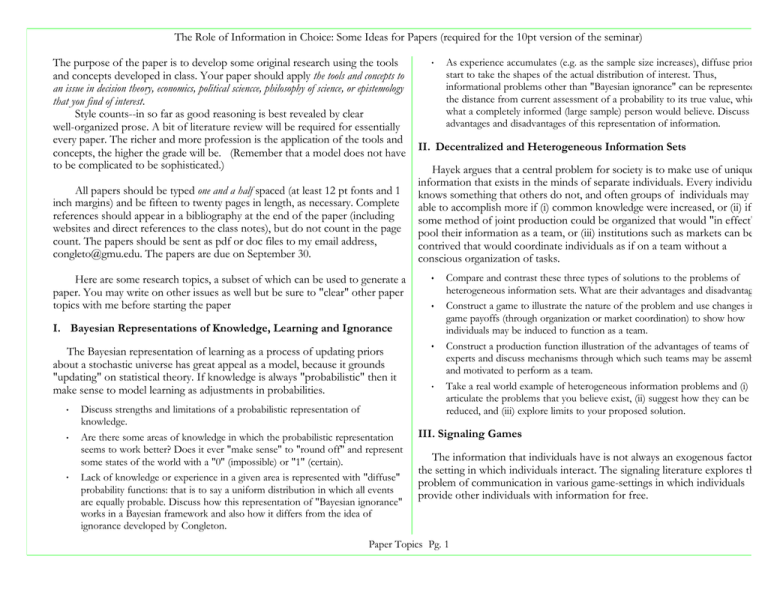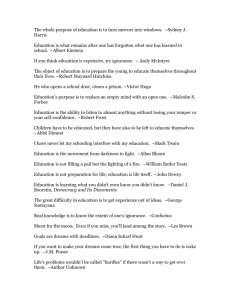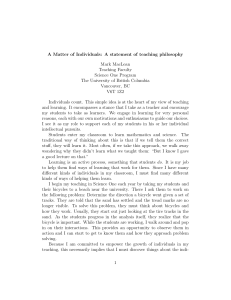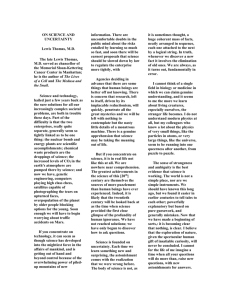Document 14894624
advertisement

The Role of Information in Choice: Some Ideas for Papers (required for the 10pt version of the seminar) The purpose of the paper is to develop some original research using the tools and concepts developed in class. Your paper should apply the tools and concepts to an issue in decision theory, economics, political sciencce, philosophy of science, or epistemology that you find of interest. Style counts--in so far as good reasoning is best revealed by clear well-organized prose. A bit of literature review will be required for essentially every paper. The richer and more profession is the application of the tools and concepts, the higher the grade will be. (Remember that a model does not have to be complicated to be sophisticated.) All papers should be typed one and a half spaced (at least 12 pt fonts and 1 inch margins) and be fifteen to twenty pages in length, as necessary. Complete references should appear in a bibliography at the end of the paper (including websites and direct references to the class notes), but do not count in the page count. The papers should be sent as pdf or doc files to my email address, congleto@gmu.edu. The papers are due on September 30. Here are some research topics, a subset of which can be used to generate a paper. You may write on other issues as well but be sure to "clear" other paper topics with me before starting the paper I. Bayesian Representations of Knowledge, Learning and Ignorance The Bayesian representation of learning as a process of updating priors about a stochastic universe has great appeal as a model, because it grounds "updating" on statistical theory. If knowledge is always "probabilistic" then it make sense to model learning as adjustments in probabilities. Discuss strengths and limitations of a probabilistic representation of knowledge. Are there some areas of knowledge in which the probabilistic representation seems to work better? Does it ever "make sense" to "round off" and represent some states of the world with a "0" (impossible) or "1" (certain). Lack of knowledge or experience in a given area is represented with "diffuse" probability functions: that is to say a uniform distribution in which all events are equally probable. Discuss how this representation of "Bayesian ignorance" works in a Bayesian framework and also how it differs from the idea of ignorance developed by Congleton. As experience accumulates (e.g. as the sample size increases), diffuse priors start to take the shapes of the actual distribution of interest. Thus, informational problems other than "Bayesian ignorance" can be represented as the distance from current assessment of a probability to its true value, which is what a completely informed (large sample) person would believe. Discuss the advantages and disadvantages of this representation of information. II. Decentralized and Heterogeneous Information Sets Hayek argues that a central problem for society is to make use of unique information that exists in the minds of separate individuals. Every individual knows something that others do not, and often groups of individuals may be able to accomplish more if (i) common knowledge were increased, or (ii) if some method of joint production could be organized that would "in effect" pool their information as a team, or (iii) institutions such as markets can be contrived that would coordinate individuals as if on a team without a conscious organization of tasks. Compare and contrast these three types of solutions to the problems of heterogeneous information sets. What are their advantages and disadvantages? Construct a game to illustrate the nature of the problem and use changes in game payoffs (through organization or market coordination) to show how individuals may be induced to function as a team. Construct a production function illustration of the advantages of teams of experts and discuss mechanisms through which such teams may be assembled and motivated to perform as a team. Take a real world example of heterogeneous information problems and (i) articulate the problems that you believe exist, (ii) suggest how they can be reduced, and (iii) explore limits to your proposed solution. III. Signaling Games The information that individuals have is not always an exogenous factor of the setting in which individuals interact. The signaling literature explores the problem of communication in various game-settings in which individuals provide other individuals with information for free. Paper Topics Pg. 1 The Role of Information in Choice: Some Ideas for Papers (required for the 10pt version of the seminar) Consider the case in which individuals are "programmed" to provide only honest information--that is to say they can only send messages that they believe to be true. To what extent can such honest signaling overcome the problems of desegregated information outlined by Hayek? (Note that "listening" or "processing" information is itself not "free" even if the signals are freely provided; moreover the cost of sending messages may also be greater than zero for the signalers.) What gaming possibilities are there in an "honest" signally contest? That is to say, what kinds of messages will signalers choose to send? (Model this for a simple decision making setting.) Consider how signaling equilibria are affected by the possibility of "fooling" people in cases in which false messages are sent. Does this greatly change the nature of signaling equilibria over the honest signaling game? Does being dishonest always pay? In which cases will individuals nonetheless tell the truth, even though false statements are possible? Many societies have norms that attempt to inhibit the telling of lies. Why do such norms exist? What problems do they exist? How effective are they? In which cases, if any, do honesty norms allow false or misleading statements to be made? Signaling contests often have the structure of rent-seeking games. That is to say individuals over invest in signals, to the detriment of all players in the game. Analyze possible institutional or normative solutions to such dilemmas? Analyze a real world setting in which one or more of these signaling problems exists and is an important determinant of private or public decisions. IV. The Veil of Ignorance Many modern political philosophers--Rawls, Buchanan, and Harsanyi--argue that ignorance can make political decision making work better, especially in cases in which unanimous agreement is used. Discuss cases in which "ignorance is bliss." Does additional knowledge always make an individual, team, or organization function better? Why or why not? Provide examples or analyze a real world case of some importance. Discuss why the above political theorists believe that individuals may have too much information. What specific kind of information are they concerned about? Why does that specific kind of information cause problems? To what extent do the methods through which information problems are overcome conflict with the productivity of Rawls' veil of ignorance? V. Rational Ignorance Normally we use the term "rational" to mean dispassionate and well informed. When we claim that it can be "rational" to be "ignorant" we are thus engaged in word play with a double meaning. Why do some economists and political scientists insist that people may be rationally ignorant? To what extent can such informationally bounded decision makers be rational? Use the ignorance concept (as developed by Congleton) to criticize or analyze a theory of learning or of scientific development. To what extent are changes in ignorance the main process through which knowledge and scientific breakthroughs are accumulated? Can it be known how important ignorance is? To what extent should we simply ignore our ignorance, whether it is rational or natural in origin? (i) if we want to maximize utility? (ii) if we want to understand what is possible? (ii) if we want to live a full and interesting "good life?." VI. Information Aggregating Institutions and Technologies Several institutions have the effect of reducing the importance of individual information problems, as for example markets, majority rule, and betting markets may produce better or at least more informed outcomes for all individuals than would be possible for any single person. Analyze the relative merits of these institutional solutions either in general or with a specific application or problem in mind. How does team production among specialists differ from economies of scale in homogeneous laber? How do markets change the extent to which information is decentralized, and the extent of information "possessed" by the members of a socicety? Paper Topics Pg. 2 The Role of Information in Choice: Some Ideas for Papers (required for the 10pt version of the seminar) Analyze how betting markets can aggregate the information that individual's possess by inducing "betters" to take account of their own uncertainties and the possibility that they are wrong. What determines the price of an "option" in a betting market at the margin? VII. Information Processing and Rational Ignorance The cost of acquring information can be decomposed into "data acquisition" costs and "information processing" costs. Knowlege exists in the mind and it takes time to transform "data" into "knowledge." In some cases, people choose to be rationally ignorant because the data collection costs are very high, in other cases they choose to do so because there is simply not enough time to process freely available information. Analyze how the internet has affected decisions to remain rationally ignorant for these two somewhat different reasons. In what sense can the internet be said to make more "ignorance" natural? In what sense can the internet be said to decrease informational heterogeneity? Analyze how innovations in information technology have allowed individuals to have better access to information, as for example with (i) language, (ii) schools, (iii) standardized alphabets, (iv) libraries, (v) telegraphs and telephones, (vi) radio and televisions, (vii) computers, and (viii) the internet. How would such innovations affect patterns of economic and political life (scale, specialization, error rates). Analyze some area(s) of life and public policy analysis in which "processing" and "data collection" costs differ significantly. Are decisions better (more likely to advance self interests) in either of your settings? Can Processing and Data Collection costs be manipulated to try to affect the behavior of other persons? If so, give examples from consumer choice or electoral choice. If not, explain why individuals are able to avoid being manipulated by groups that subsidize the provision of some kinds of information. Analyze how "processing costs" affect the extent to which an individual has accurate (unbiased) information upon which to base his day to day and lifetime choices, and the probability of systematic error. What institutions or public policies operate to reduce such errors. It can be argued that "data" is a pure public good, but that "knowledge" is a pure private good. Is this true? VIII. Innovation Policy Innovation can be thought of as a process by which economically relevant information is produced. That is to say, innovation tends to produce new information about how something can be done (reduces ignorance) and also through experiments refines how existing products are made (increases data se about known objects or theories). Use the informational nature of innovation to analyze the differences between the entrepreneurial theories of Knight, Schumpeter, and Kirzner. Analyze how public policies may increase the supply (or availability) of economically useful information. For example, patent rights create contests in which inventers strive to be "first" in order to secure temporary monopoly profits. Subsidies for R&D may similarly encourage the production of new useful information. Analyze innovation inhibiting policies, such as scientific censorship. Are their cases in which "censorship" improves decision making? How is censorship different than editorial selection of papers ot publish in scientific journals? IX. Any other topic that lends itself to analysis using the tools and /or concepts developed in this course.. (Please clear other topics with me. I will try to give you a sense of whether your idea is sufficient or too much for the purposes of this class and for the deadline at which the papers are due.) Paper Topics Pg. 3



